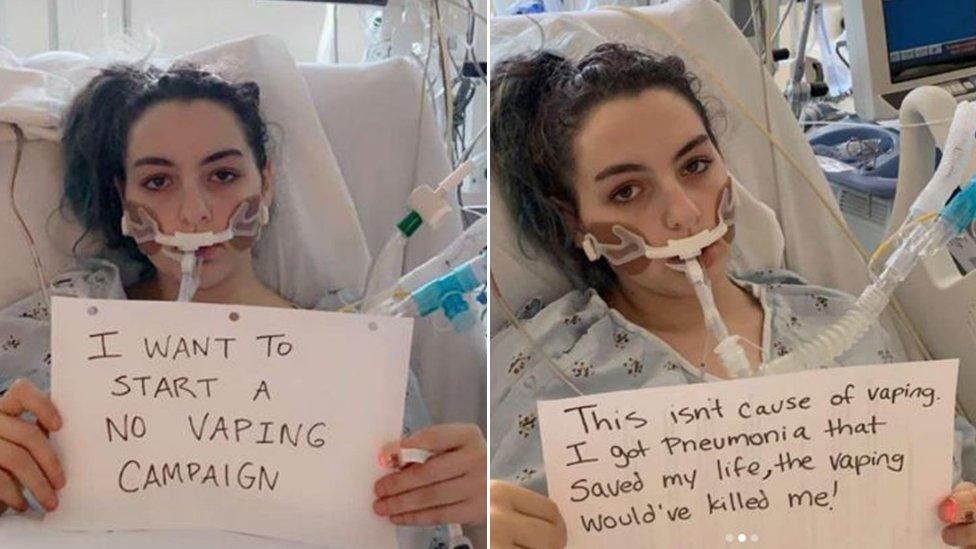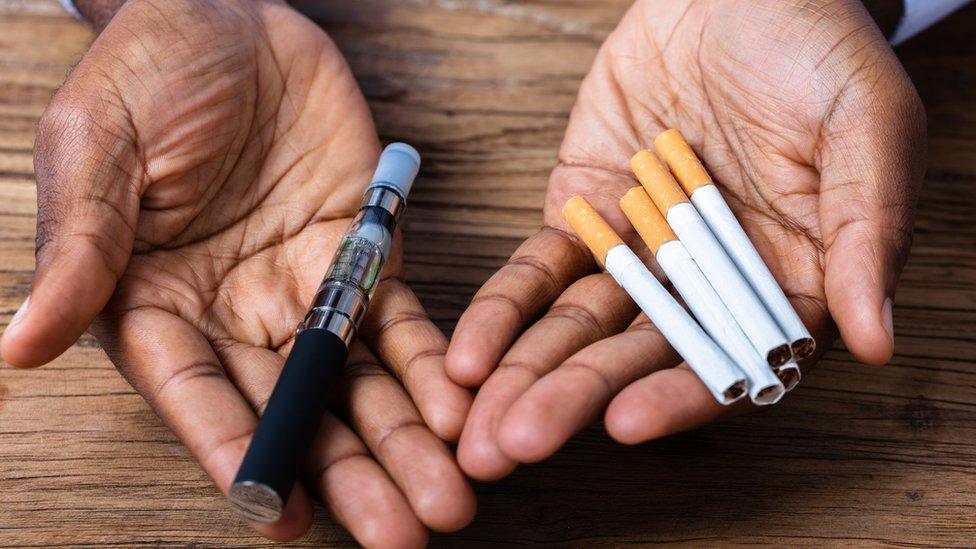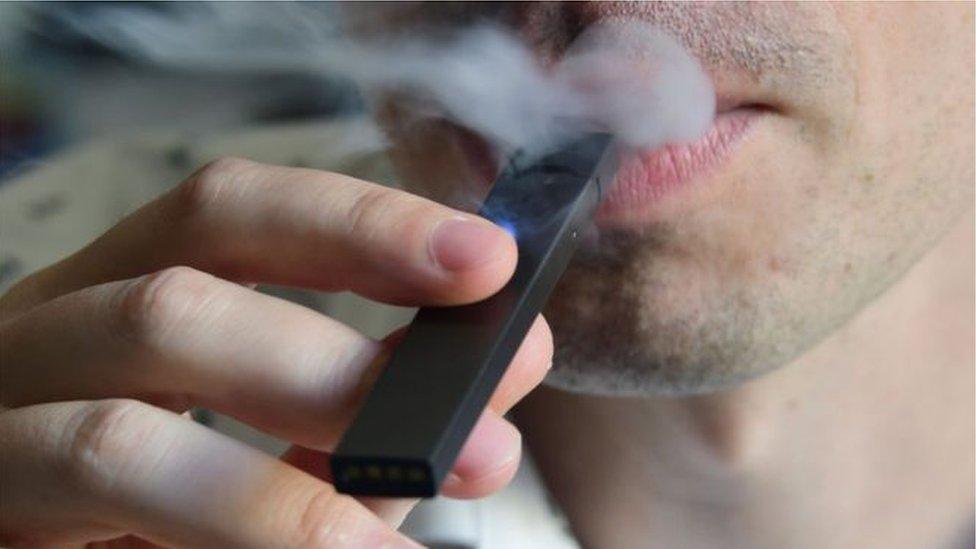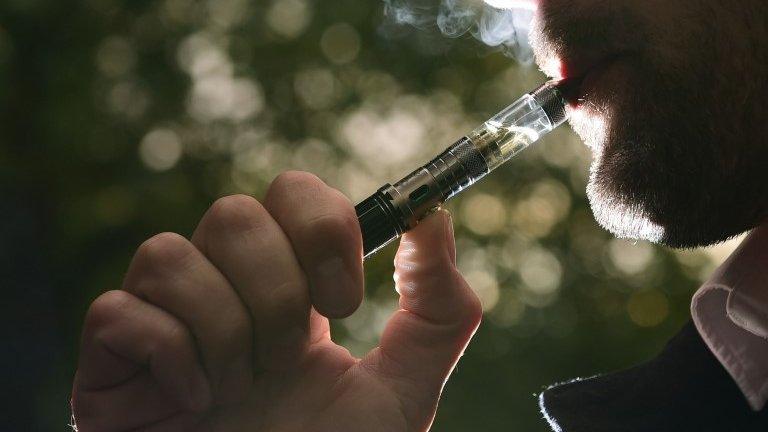What's behind a vaping illness outbreak in the US?
- Published

There have been 450 reported cases of lung illnesses from vaping in the US
There's no denying that vapes and e-cigarettes are huge right now, with nearly three million UK users, external.
Vaping - which involves inhaling a mix typically made of nicotine, water, solvents and flavours - is seen as an alternative to smoking, external which can help you quit, but its safety is still not entirely known.
But over in the US, the potential health risks are in the spotlight, where this year there have been 450 reported cases, external of lung illness tied to vaping.
There have also been at least six deaths, external across 33 states.

One of the most shocking stories was of 18-year-old Simah Herman, who posted a picture of herself online after waking up from a medically induced coma.
After receiving treatment for pneumonia and lung failure, she wants to warn others against using vapes and e-cigarettes.
Simah's story, and that of other vape users, have raised questions about how safe vaping is and how well regulated the industry is.
Health officials at the Food and Drug Administration (FDA), who are responsible for protecting public health in the US, have been trying to identify what's been causing these problems.
What are the symptoms?

Vaping products come in many different forms - vape pens, e-cigarettes and more traditional vaporisers
According to a 2016 survey, external, there are about 10 million vapers in the US and nearly half of those are under 35, with 18-24-year-olds , externalthe most regular users.
It comes then as little surprise that many of the 450 people affected are young people, with an average age of 19.
The symptoms people have reported experiencing include severe pneumonia, external, shortness of breath, coughing, fever, fatigue and respiratory failure , external- where your body either can't break down oxygen, produce carbon dioxide, or both. The result is that your lungs stop working and breathing becomes difficult.
Those affected used a number of different devices from vaporisers to smaller e-cigarettes and a variety of different brands of liquids and cartridges.
The FDA has now collected over 120 samples to test for different chemicals, including nicotine, cannabinoids, additives and pesticides.
What's to blame?

Vaping is seen as safer than smoking because lower levels of the harmful chemicals found in tobacco smoke are produced
Health investigators in the US are trying to establish whether a particular toxin or substance is behind the outbreak, or whether it's the result of heavy usage.
One of the theories is that a bad ingredient could have been added to vaping liquids including marijuana products - which are legally available in some US states - namely Vitamin E.
Last week, the New York State health department, external started investigating Vitamin E, calling it a "key focus" of their studies after 34 people became ill in the state.
However, the FDA have not settled on Vitamin E as the cause and won't rule out other vaping liquid chemicals.
There is also suspicion about "thickeners" that have been added to vaping liquids used in e-cigarettes and vaporisers.
In the UK, health experts say they are not aware of any similar incidents with UK-regulated products.
Martin Dockrell, Head of Tobacco Control at Public Health England says: "A full investigation is not yet available but we've heard reports that most of these cases were linked to people using illicit vaping fluid bought on the streets or homemade, some containing cannabis products, like THC, or synthetic cannabinoids, like Spice.
"Unlike the US, all e-cigarette products in the UK are tightly regulated for quality and safety by the Medicines and Healthcare products Regulatory Agency and they operate the Yellow Card Scheme, encouraging vapers to report any bad experiences."
Is this a new phenomenon?

A man died in the US last year after his vape pen blew up
This is not the first time vaping has given cause for concern. The British Medical Journal published a report last year , externalof a woman who was hospitalised with a cough, fever, night sweats and respiratory failure.
They found the cause of her problem was a vegetable glycerine found in her e-cigarette, but reported she refused to give it up at the time.
As well as being linked to lung problems, there have also been reports of vape pens exploding - in rare cases with fatal consequences.
Earlier this year, a 24-year-old man from Texas died when his vape pen's battery blew up sending shards of metal into his face and neck and severing an artery.
However, as Public Health England point out, external, in the UK there are stricter regulations on vaping devices, with their safety and quality checked, meaning this would be a lot less likely to happen.
Another problem is that e-cigarettes and vapes are fairly new products so doctors don't know what advice to offer says the chair of the American Academy of Paediatrics tobacco control section, external, Susan Walley.
The advice in the meantime from American health professionals, external has been to avoid vaping altogether while investigations take place.
In the UK, Public Health England's advice remains that e-cigarettes are "a fraction of the risk of smoking".
The government agency reminds vapers "to use UK-regulated e-liquids and never risk vaping home-made or illicit e-liquids or adding substances, any of which could be harmful."


Follow Newsbeat on Instagram, external, Facebook, external, Twitter, external and YouTube, external.
Listen to Newsbeat live at 12:45 and 17:45 weekdays - or listen back here.
- Published9 September 2019

- Published5 September 2019

- Published4 September 2019
